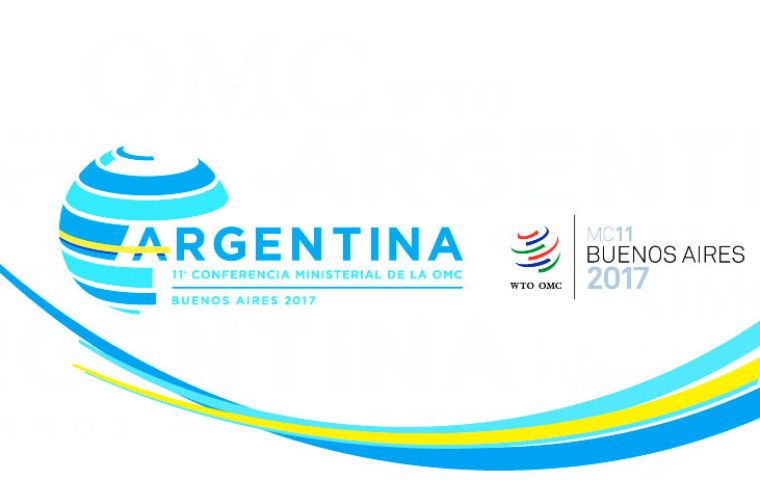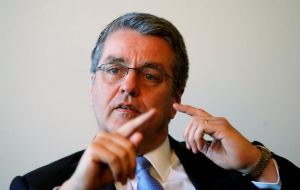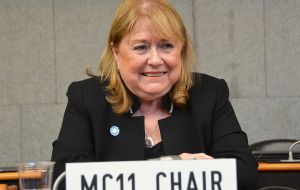MercoPress. South Atlantic News Agency
WTO summit takes off in Buenos Aires: anybody's guess what the outcome can be
 The Trump administration has made WTO a preferred target of its “America First” policy, threatening to pull America out of the trade organization
The Trump administration has made WTO a preferred target of its “America First” policy, threatening to pull America out of the trade organization  “There are several subjects on the table. On any of them, we may have some convergences on certain topics, or not, I don't know” Roberto Azevedo admitted
“There are several subjects on the table. On any of them, we may have some convergences on certain topics, or not, I don't know” Roberto Azevedo admitted  Argentina's Susana Malcorra, who will preside the meeting, was more upbeat recently, saying a deal was likely to end harmful fisheries subsidies
Argentina's Susana Malcorra, who will preside the meeting, was more upbeat recently, saying a deal was likely to end harmful fisheries subsidies Under fire from the United States, wracked by disagreements over China and unable to kick-start stalled trade talks, the World Trade Organization meets under a cloud in Argentina from this Sunday. The Buenos Aires meeting will be the first in the era of US President Donald Trump, who has pummeled the 164-member body relentlessly since taking office, even describing it as a “disaster”
The Trump administration had made the WTO a preferred target of its “America First” policy, threatening to pull America out of the trade organization it says is hampering its ability to compete. Expectations of any kind of a breakthrough at the Buenos Aires meeting are low.
“There are several subjects on the table. On any of them, we may have some convergences on certain topics, or not, I don't know,” was the underwhelming assessment of WTO Director General Roberto Azevedo at a briefing at the end of November.
Argentina's Susana Malcorra, who will preside over December 10 to 13 meeting, was more upbeat recently, saying a deal was likely to end harmful fisheries subsidies, keenly of interest to developing countries.
She was also positives about the prospects of a EU-Mercosur (Argentina, Brazil, Uruguay and Paraguay) trade deal finally coming to fruition 18 years after talks first began.
“In a context where global trade has been called into question, it is fundamental that two such considerable markets announce they are ready” to seal a deal, she said
Washington has been blamed for blocking appointments of judges to the WTO's dispute settlement system, saying it was ineffective and insisting on a more aggressive approach to defending its interests.
The dispute body arbitrates international rows over subsidies or tariffs, among other things playing an important role in the standoff between US and European plane-makers Boeing and Airbus.
“The appellate body will be down to 4 members from its regular seven-member contingent from the middle of next month,” lamented a Geneva trade official.
WTO critics say it has failed to shunt forward the so-called Doha round of trade talks, despite 15 years of effort, and point to the body's apparent powerlessness in dealing with problems posed by China, which joined the WTO in 2001.
Beijing wants to be seen by the WTO as a “market economy” but the Europeans and the United States – for once on the same wavelength on trade issues – oppose any such recognition, a distinction which would entitle it to preferential economic treatment under WTO rules.
It is currently classed as a non-market economy, which allows the US and others to use a special recourse to levy anti-dumping duties against it if they decide that it is selling its goods – chiefly steel and aluminum – at unfairly low prices in other countries.
A European diplomat in Buenos Aires said protectionist US rhetoric may have motivational effects on negotiations between the EU and Mercosur. As if to prove him right, the EU and Japan announced Friday that they have finalized a major trade agreement.




Top Comments
Disclaimer & comment rules-

Read all comments“anybody's guess what the outcome can be”
Dec 12th, 2017 - 11:28 am 0National embarrassment for the Macri gang it seems, with the banning of WTO accredited activists now impossible to ignore
Commenting for this story is now closed.
If you have a Facebook account, become a fan and comment on our Facebook Page!